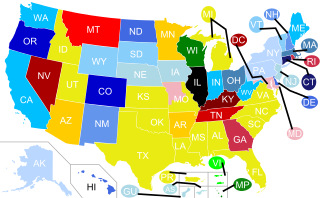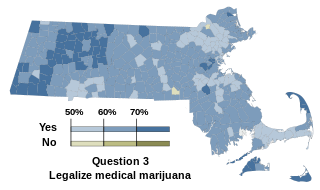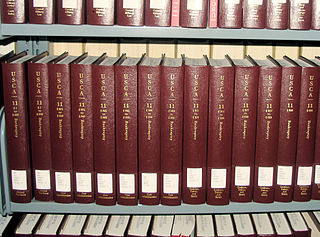An Act of Congress is a statute enacted by the United States Congress. It can either be a Public Law, relating to the general public, or a Private Law, relating to specific institutions or individuals.

Sodomy laws in the United States, which outlawed a variety of sexual acts, were inherited from British criminal laws with roots in the Christian religion of Late antiquity. While they often targeted sexual acts between persons of the same sex, many statutes employed definitions broad enough to outlaw certain sexual acts between persons of different sexes as well, sometimes also acts between married persons.

The Oregon Constitution is the governing document of the U.S. state of Oregon, originally enacted in 1857. As amended the current state constitution contains eighteen sections, beginning with a bill of rights. This contains most of the rights and privileges granted in the United States Bill of Rights and the main text of the United States Constitution. The remainder of the Oregon Constitution outlines the divisions of power within the state government, lists the times of elections, and defines the state boundaries and the capital as Salem.
First National Bank of Boston v. Bellotti, 435 U.S. 765 (1978), is a U.S. constitutional law case which defined the free speech right of corporations for the first time. The United States Supreme Court held that corporations have a First Amendment right to make contributions to ballot initiative campaigns. The ruling came in response to a Massachusetts law that prohibited corporate donations in ballot initiatives unless the corporation's interests were directly involved.

In the United States, Election Day is the day set by law for the general elections of federal public officials. It is statutorily set as "the Tuesday next after the first Monday in the month of November" or "the first Tuesday after November 1". The earliest possible date is November 2, and the latest possible date is November 8.
A repeal is the removal or reversal of a law. There are two basic types of repeal, a repeal with a re-enactment of the repealed law, or a repeal without any replacement.

The Archivist of the United States is the chief official overseeing the operation of the National Archives and Records Administration (NARA). The first Archivist, R.D.W. Connor, began serving in 1934, when the National Archives was established as an independent federal agency by Congress. The Archivists served as subordinate officials of the General Services Administration from 1949 until the National Archives and Records Administration became an independent agency again on April 1, 1985. The position is held by David Ferriero, who was named to the office in 2009.
The short title is the formal name by which a piece of primary legislation may by law be cited in the United Kingdom and other Westminster-influenced jurisdictions, as well as the United States and the Philippines. It contrasts with the long title which, while usually being more fully descriptive of the legislation's purpose and effects, is generally too unwieldy for most uses. For example, the short title House of Lords Act 1999 contrasts with the long title An Act to restrict membership of the House of Lords by virtue of a hereditary peerage; to make related provision about disqualifications for voting at elections to, and for membership of, the House of Commons; and for connected purposes.
An organic law is a law, or system of laws, that form the foundation of a government, corporation or any other organization's body of rules. A constitution is a particular form of organic law for a sovereign state.
The Internal Revenue Code (IRC), formally the Internal Revenue Code of 1986, is the domestic portion of federal statutory tax law in the United States, published in various volumes of the United States Statutes at Large, and separately as Title 26 of the United States Code (USC). It is organized topically, into subtitles and sections, covering income tax, payroll taxes, estate taxes, gift taxes, and excise taxes; as well as procedure and administration. Its implementing agency is the Internal Revenue Service.

The United States Statutes at Large, commonly referred to as the Statutes at Large and abbreviated Stat., are an official record of Acts of Congress and concurrent resolutions passed by the United States Congress. Each act and resolution of Congress is originally published as a slip law, which is classified as either public law or private law (Pvt.L.), and designated and numbered accordingly. At the end of a Congressional session, the statutes enacted during that session are compiled into bound books, known as "session law" publications. The session law publication for U.S. Federal statutes is called the United States Statutes at Large. In that publication, the public laws and private laws are numbered and organised in chronological order. U.S. Federal statutes are published in a three-part process, consisting of slip laws, session laws, and codification.
A rape shield law is a law that limits the ability to introduce evidence or cross-examine rape complainants about their past sexual behavior. The term also refers to a law that prohibits the publication of the identity of an alleged rape victim.

Ted W. Lieu is an American politician serving as the U.S. Representative for California's 33rd congressional district since 2015. The district serves much of western Los Angeles, as well as Beverly Hills, Santa Monica, Bel Air, the Palos Verdes Peninsula and the Beach Cities.
Title 1 of the United States Code outlines the general provisions of the United States Code.
Title 6 of the United States Code is non-positive law title of the United States Code governing Domestic Security.
Title 34 of the United States Code is a non-positive law title of the United States Code with the heading "Crime Control and Law Enforcement." Released on September 1, 2017 by the Office of the Law Revision Counsel of the U.S. House, it contains "crime control and law enforcement programs or activities in which the Attorney General or the Department of Justice have been given primary responsibility." Much of the law transferred to Title 34 were laws editorially classified to sections of Title 42 or set out as notes to Titles 42, 18, and 28.

The Fraud Enforcement and Recovery Act of 2009, or FERA, Pub.L. 111–21, S. 386, 123 Stat. 1617, enacted May 20, 2009, is a public law in the United States enacted in 2009. The law enhanced criminal enforcement of federal fraud laws, especially regarding financial institutions, mortgage fraud, and securities fraud or commodities fraud.

The Massachusetts Medical Marijuana Initiative, appeared as the third question on the state's 2012 ballot as an indirect initiated state statute. The measure allows cannabis to be used for medical purposes in the state. The initiative—backed by the American Civil Liberties Union, the Massachusetts Patient Advocacy Alliance, and the Committee for Compassionate Medicine—was filed with proponents turning in the required signatures to the Massachusetts Attorney General's office by the August 3, 2011 deadline. Those signatures were needed for the required ten qualified voters who submitted the original petition to put forward the full text of the law they want enacted. The initiative passed with support from 63% of state voters.









